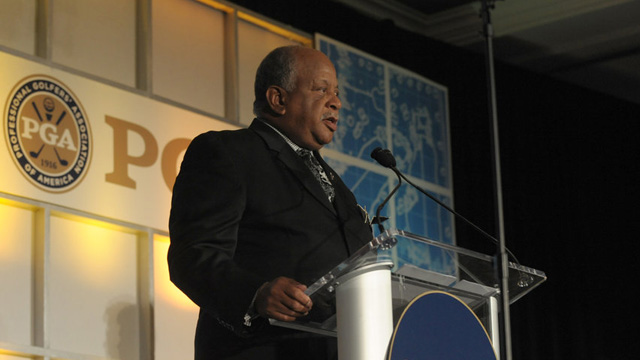NEWS
Son of African-American golf pioneer shares insight on growing game

At the 93rd PGA Annual Meeting in 2009, The PGA formalized the unanimous decision to acknowledge three courageous African-American golf pioneers by granting them posthumous PGA membership. Those men were Ted Rhodes, John Shippen and Bill Spiller. Also at that time, legendary boxing champ Joe Louis was posthumously recognized as an Honorary PGA member.
On that day, then-PGA President Remy said: "They say you can't turn back time, but you can do your very best to make it right."
Bill Spiller Jr. admitted during his speech that when he first received word that his father had been elected to PGA membership, he was unsure how to react after years of watching him suffer indignities because of the color of his skin.
"But The PGA of 1950 is not the same PGA today," said Spiller. "My family and I are very happy that this decision has been made. We're happy to know that our father's legacy has come full circle."
Spiller Jr., a lawyer in Los Angeles, Calif., is himself a golfer. In celebration of Black History Month, Spiller shares some of his insights on how to grow and drive diversity among the game and business of golf:
What are your recommendations on how golf can reach more minorities at the grassroots level?
Spiller: You initiate interest in golf by creating a belief system, so people can truly start to believe that it's something other than an "elitist" endeavor.
If one isn't introduced to the game, one typically never generates enough interest to take the initiative and satisfy the curiosity. The game must be made available in a manner that makes it achievable to those who do not have the fortune of being introduced, or that live close enough to a course and have access to what goes on there.
Is there a way to make golf more prevalent for minority youths?
Spiller: A mindset of achievement needs to be created separate and apart from the "overnight riches" endeavors linked to basketball or football.
Many minority and inner-city kids look at sports as their only way out, and that doesn't mean going professional. They understand that sports can earn them college scholarships and afford them the opportunity to get an education. When it comes to the golf industry, not enough is done to educate the masses about the business of golf. Golf is seen in terms of the PGA Tour and the country club lifestyle. Minority kids aren't aware that golf is actually a business and with hard work and dedication positive results are achievable.
What got your dad and his colleagues into the game of golf?
Spiller: I don't know what insect bit my dad and got him interested in golf initially.
However, he was a perfectionist and a type-A personality, and once he decided that he wanted to do something, nothing would stand in the way of achieving perfection - except himself - and God help anyone that did attempt to stand in his way. He felt so strongly about having the right to make a living at golf; and his real passion was not competitive play but teaching and dreaming about operating his own pro shop. He suffered tremendously, more than anyone I've seen, but he stayed steadfast in order to prove his point.
If you were in charge of the diversification component of Golf 2.0, what would you recommend for getting people into the game and keeping them playing golf?
Spiller: I'd try to expand the concept of "National Golf Day" to the point where local governments and schools are hosting activities to introduce kids to the game. You have to find sponsors (industry manufactures and associations) who are willing to support the cause. PGA Professionals need to organize clinics and seminars with test equipment available. PGA Professionals need to pass out invitations, because minorities likely won't feel welcomed to play golf unless they're invited. And finally, go to the schools and start golf programs, real competitive teams. This may be a herculean task, but one fraught with positive possibilities nevertheless.
